Exploring the Doctrine of Unreasonableness in Irish Admin Law
VerifiedAdded on 2023/05/29
|10
|3091
|334
Essay
AI Summary
This essay provides an in-depth analysis of judicial review in Irish Administrative Law, focusing on the doctrine of administrative unreasonableness. It examines how Irish courts balance individual rights and governmental powers through principles of natural justice and grounds for judicial review. The essay discusses the principle of curial deference, which restricts judicial intervention, and the traditional threshold for unreasonableness as articulated in the Associated Provincial Pictures Houses Ltd. case. It further explores the Meadows v Minister for Justice, Equality and Law Reform case as a landmark example, highlighting the importance of procedural fairness and the consideration of relevant factors in administrative decisions. The essay also delves into improper exercises of discretionary powers, including ultra vires actions, proportionality, and irrationality, as well as the reliance on irrelevant considerations. Finally, it discusses Wednesbury unreasonableness and its various manifestations in Irish court decisions, emphasizing the complexities of proving unreasonableness and the instances where courts may intervene.
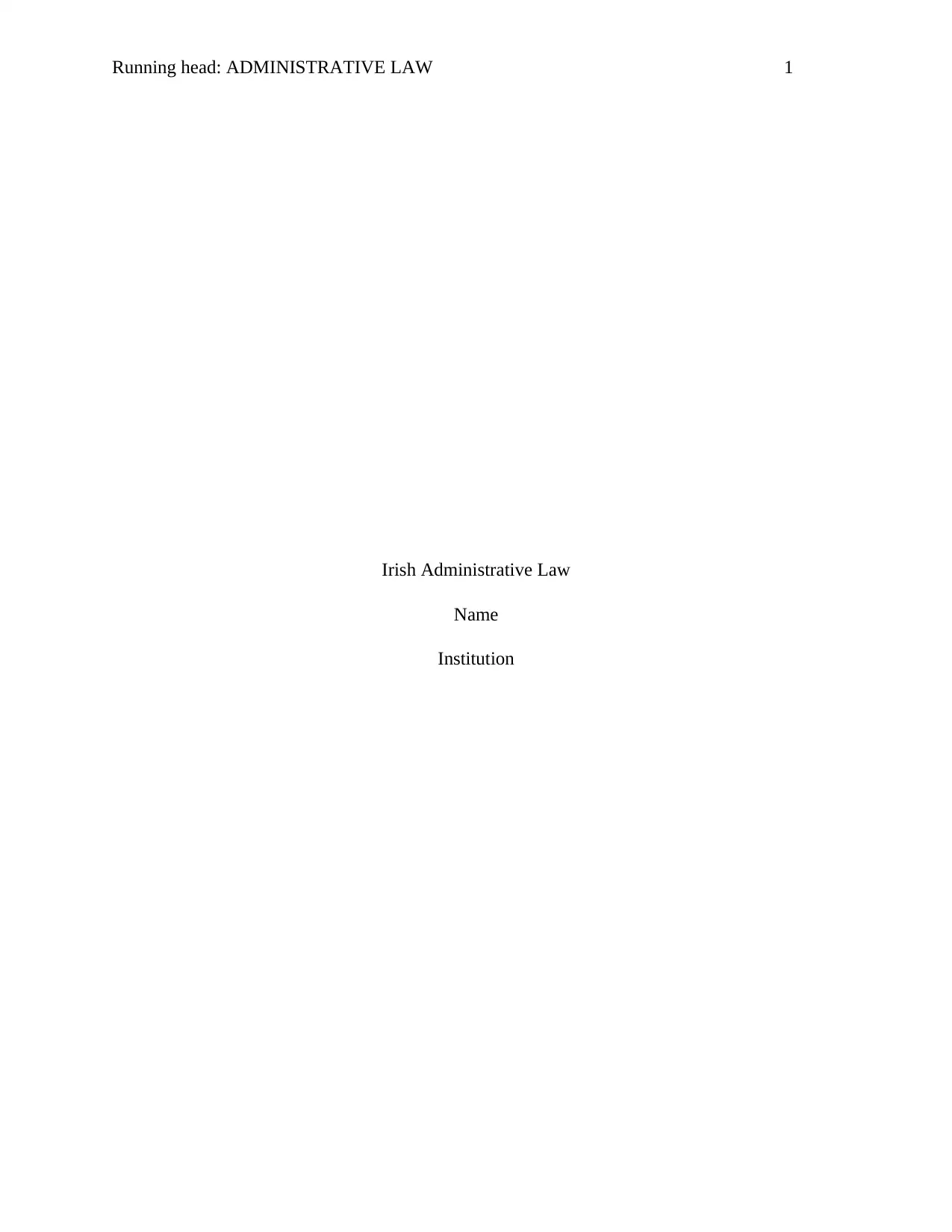
Running head: ADMINISTRATIVE LAW 1
Irish Administrative Law
Name
Institution
Irish Administrative Law
Name
Institution
Paraphrase This Document
Need a fresh take? Get an instant paraphrase of this document with our AI Paraphraser
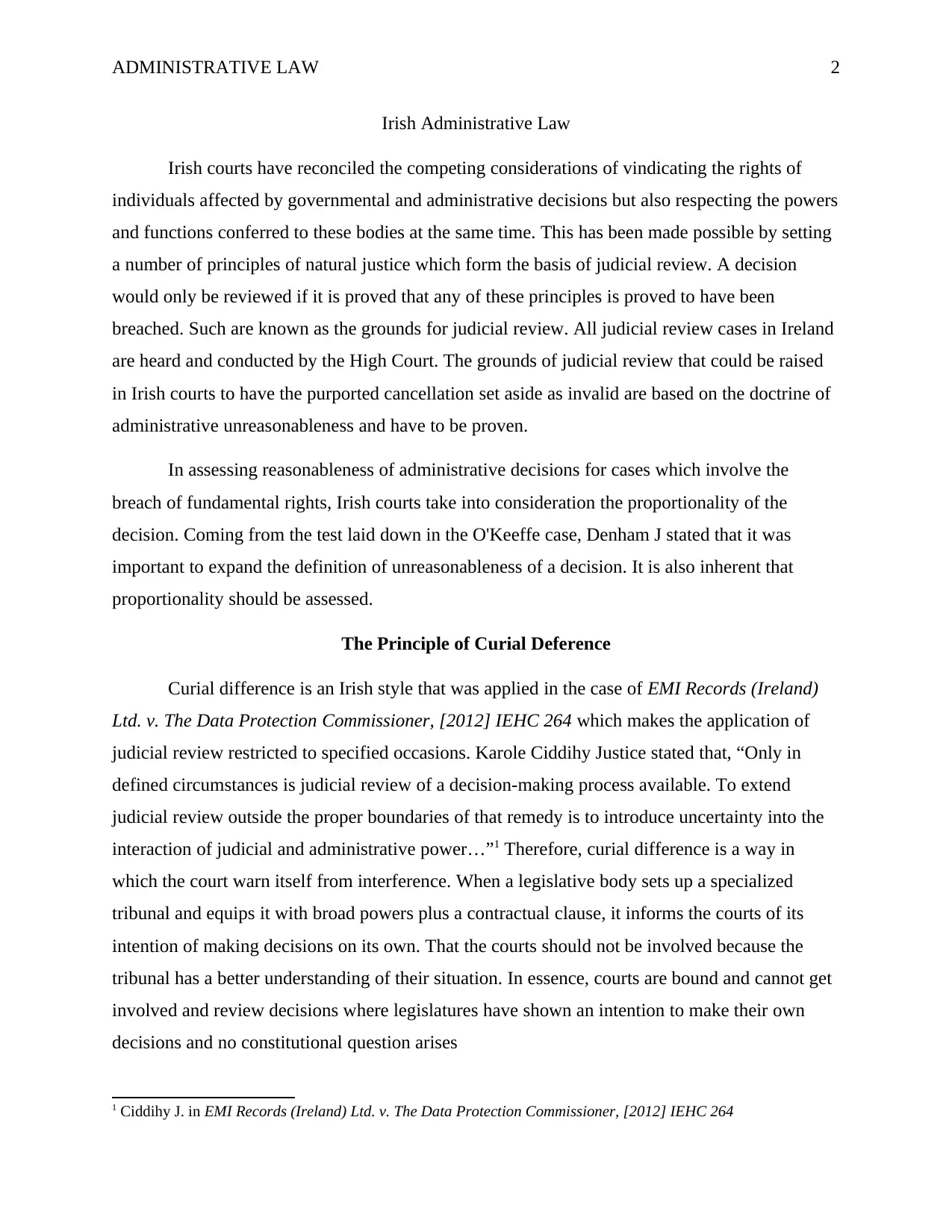
ADMINISTRATIVE LAW 2
Irish Administrative Law
Irish courts have reconciled the competing considerations of vindicating the rights of
individuals affected by governmental and administrative decisions but also respecting the powers
and functions conferred to these bodies at the same time. This has been made possible by setting
a number of principles of natural justice which form the basis of judicial review. A decision
would only be reviewed if it is proved that any of these principles is proved to have been
breached. Such are known as the grounds for judicial review. All judicial review cases in Ireland
are heard and conducted by the High Court. The grounds of judicial review that could be raised
in Irish courts to have the purported cancellation set aside as invalid are based on the doctrine of
administrative unreasonableness and have to be proven.
In assessing reasonableness of administrative decisions for cases which involve the
breach of fundamental rights, Irish courts take into consideration the proportionality of the
decision. Coming from the test laid down in the O'Keeffe case, Denham J stated that it was
important to expand the definition of unreasonableness of a decision. It is also inherent that
proportionality should be assessed.
The Principle of Curial Deference
Curial difference is an Irish style that was applied in the case of EMI Records (Ireland)
Ltd. v. The Data Protection Commissioner, [2012] IEHC 264 which makes the application of
judicial review restricted to specified occasions. Karole Ciddihy Justice stated that, “Only in
defined circumstances is judicial review of a decision-making process available. To extend
judicial review outside the proper boundaries of that remedy is to introduce uncertainty into the
interaction of judicial and administrative power…”1 Therefore, curial difference is a way in
which the court warn itself from interference. When a legislative body sets up a specialized
tribunal and equips it with broad powers plus a contractual clause, it informs the courts of its
intention of making decisions on its own. That the courts should not be involved because the
tribunal has a better understanding of their situation. In essence, courts are bound and cannot get
involved and review decisions where legislatures have shown an intention to make their own
decisions and no constitutional question arises
1 Ciddihy J. in EMI Records (Ireland) Ltd. v. The Data Protection Commissioner, [2012] IEHC 264
Irish Administrative Law
Irish courts have reconciled the competing considerations of vindicating the rights of
individuals affected by governmental and administrative decisions but also respecting the powers
and functions conferred to these bodies at the same time. This has been made possible by setting
a number of principles of natural justice which form the basis of judicial review. A decision
would only be reviewed if it is proved that any of these principles is proved to have been
breached. Such are known as the grounds for judicial review. All judicial review cases in Ireland
are heard and conducted by the High Court. The grounds of judicial review that could be raised
in Irish courts to have the purported cancellation set aside as invalid are based on the doctrine of
administrative unreasonableness and have to be proven.
In assessing reasonableness of administrative decisions for cases which involve the
breach of fundamental rights, Irish courts take into consideration the proportionality of the
decision. Coming from the test laid down in the O'Keeffe case, Denham J stated that it was
important to expand the definition of unreasonableness of a decision. It is also inherent that
proportionality should be assessed.
The Principle of Curial Deference
Curial difference is an Irish style that was applied in the case of EMI Records (Ireland)
Ltd. v. The Data Protection Commissioner, [2012] IEHC 264 which makes the application of
judicial review restricted to specified occasions. Karole Ciddihy Justice stated that, “Only in
defined circumstances is judicial review of a decision-making process available. To extend
judicial review outside the proper boundaries of that remedy is to introduce uncertainty into the
interaction of judicial and administrative power…”1 Therefore, curial difference is a way in
which the court warn itself from interference. When a legislative body sets up a specialized
tribunal and equips it with broad powers plus a contractual clause, it informs the courts of its
intention of making decisions on its own. That the courts should not be involved because the
tribunal has a better understanding of their situation. In essence, courts are bound and cannot get
involved and review decisions where legislatures have shown an intention to make their own
decisions and no constitutional question arises
1 Ciddihy J. in EMI Records (Ireland) Ltd. v. The Data Protection Commissioner, [2012] IEHC 264
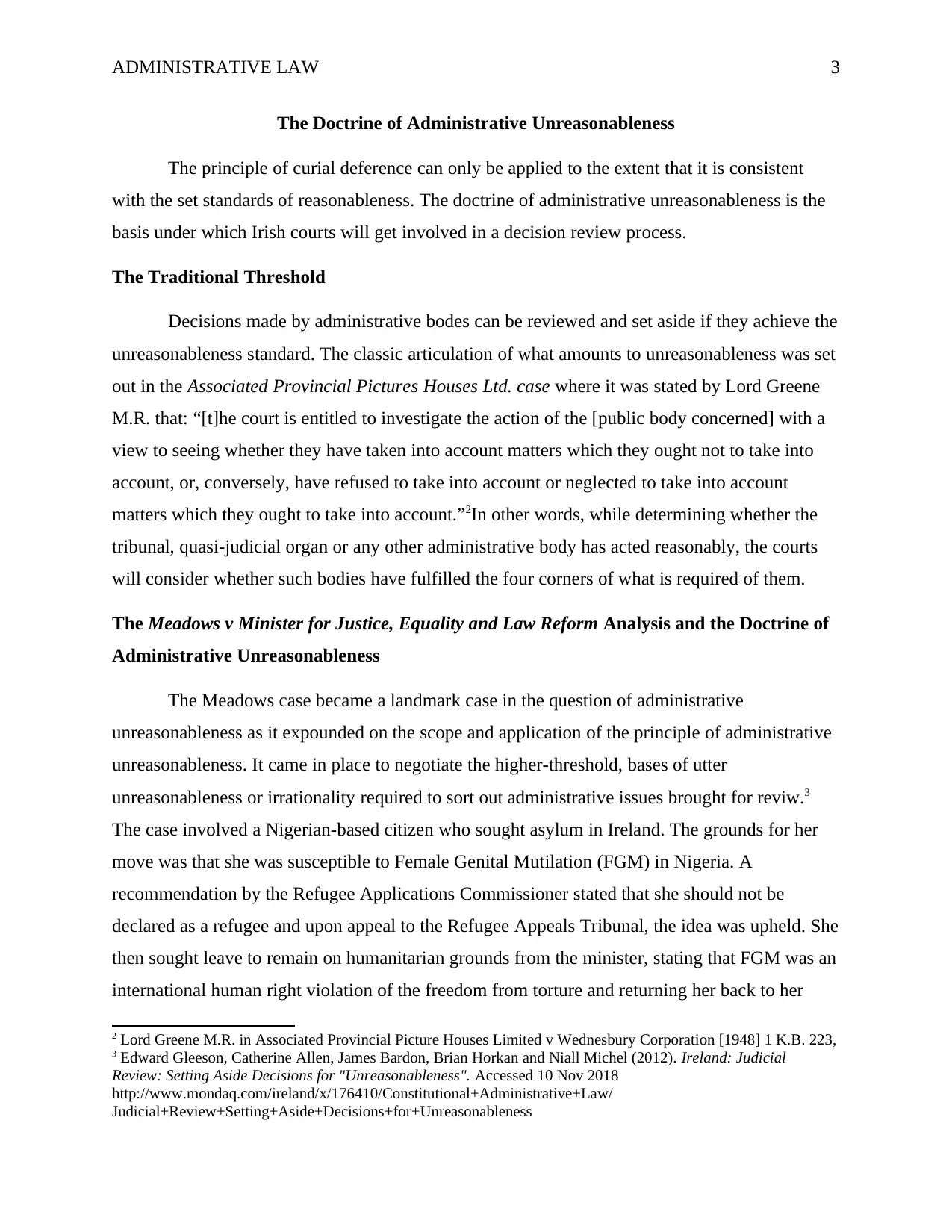
ADMINISTRATIVE LAW 3
The Doctrine of Administrative Unreasonableness
The principle of curial deference can only be applied to the extent that it is consistent
with the set standards of reasonableness. The doctrine of administrative unreasonableness is the
basis under which Irish courts will get involved in a decision review process.
The Traditional Threshold
Decisions made by administrative bodes can be reviewed and set aside if they achieve the
unreasonableness standard. The classic articulation of what amounts to unreasonableness was set
out in the Associated Provincial Pictures Houses Ltd. case where it was stated by Lord Greene
M.R. that: “[t]he court is entitled to investigate the action of the [public body concerned] with a
view to seeing whether they have taken into account matters which they ought not to take into
account, or, conversely, have refused to take into account or neglected to take into account
matters which they ought to take into account.”2In other words, while determining whether the
tribunal, quasi-judicial organ or any other administrative body has acted reasonably, the courts
will consider whether such bodies have fulfilled the four corners of what is required of them.
The Meadows v Minister for Justice, Equality and Law Reform Analysis and the Doctrine of
Administrative Unreasonableness
The Meadows case became a landmark case in the question of administrative
unreasonableness as it expounded on the scope and application of the principle of administrative
unreasonableness. It came in place to negotiate the higher-threshold, bases of utter
unreasonableness or irrationality required to sort out administrative issues brought for reviw.3
The case involved a Nigerian-based citizen who sought asylum in Ireland. The grounds for her
move was that she was susceptible to Female Genital Mutilation (FGM) in Nigeria. A
recommendation by the Refugee Applications Commissioner stated that she should not be
declared as a refugee and upon appeal to the Refugee Appeals Tribunal, the idea was upheld. She
then sought leave to remain on humanitarian grounds from the minister, stating that FGM was an
international human right violation of the freedom from torture and returning her back to her
2 Lord Greene M.R. in Associated Provincial Picture Houses Limited v Wednesbury Corporation [1948] 1 K.B. 223,
3 Edward Gleeson, Catherine Allen, James Bardon, Brian Horkan and Niall Michel (2012). Ireland: Judicial
Review: Setting Aside Decisions for "Unreasonableness". Accessed 10 Nov 2018
http://www.mondaq.com/ireland/x/176410/Constitutional+Administrative+Law/
Judicial+Review+Setting+Aside+Decisions+for+Unreasonableness
The Doctrine of Administrative Unreasonableness
The principle of curial deference can only be applied to the extent that it is consistent
with the set standards of reasonableness. The doctrine of administrative unreasonableness is the
basis under which Irish courts will get involved in a decision review process.
The Traditional Threshold
Decisions made by administrative bodes can be reviewed and set aside if they achieve the
unreasonableness standard. The classic articulation of what amounts to unreasonableness was set
out in the Associated Provincial Pictures Houses Ltd. case where it was stated by Lord Greene
M.R. that: “[t]he court is entitled to investigate the action of the [public body concerned] with a
view to seeing whether they have taken into account matters which they ought not to take into
account, or, conversely, have refused to take into account or neglected to take into account
matters which they ought to take into account.”2In other words, while determining whether the
tribunal, quasi-judicial organ or any other administrative body has acted reasonably, the courts
will consider whether such bodies have fulfilled the four corners of what is required of them.
The Meadows v Minister for Justice, Equality and Law Reform Analysis and the Doctrine of
Administrative Unreasonableness
The Meadows case became a landmark case in the question of administrative
unreasonableness as it expounded on the scope and application of the principle of administrative
unreasonableness. It came in place to negotiate the higher-threshold, bases of utter
unreasonableness or irrationality required to sort out administrative issues brought for reviw.3
The case involved a Nigerian-based citizen who sought asylum in Ireland. The grounds for her
move was that she was susceptible to Female Genital Mutilation (FGM) in Nigeria. A
recommendation by the Refugee Applications Commissioner stated that she should not be
declared as a refugee and upon appeal to the Refugee Appeals Tribunal, the idea was upheld. She
then sought leave to remain on humanitarian grounds from the minister, stating that FGM was an
international human right violation of the freedom from torture and returning her back to her
2 Lord Greene M.R. in Associated Provincial Picture Houses Limited v Wednesbury Corporation [1948] 1 K.B. 223,
3 Edward Gleeson, Catherine Allen, James Bardon, Brian Horkan and Niall Michel (2012). Ireland: Judicial
Review: Setting Aside Decisions for "Unreasonableness". Accessed 10 Nov 2018
http://www.mondaq.com/ireland/x/176410/Constitutional+Administrative+Law/
Judicial+Review+Setting+Aside+Decisions+for+Unreasonableness
⊘ This is a preview!⊘
Do you want full access?
Subscribe today to unlock all pages.

Trusted by 1+ million students worldwide
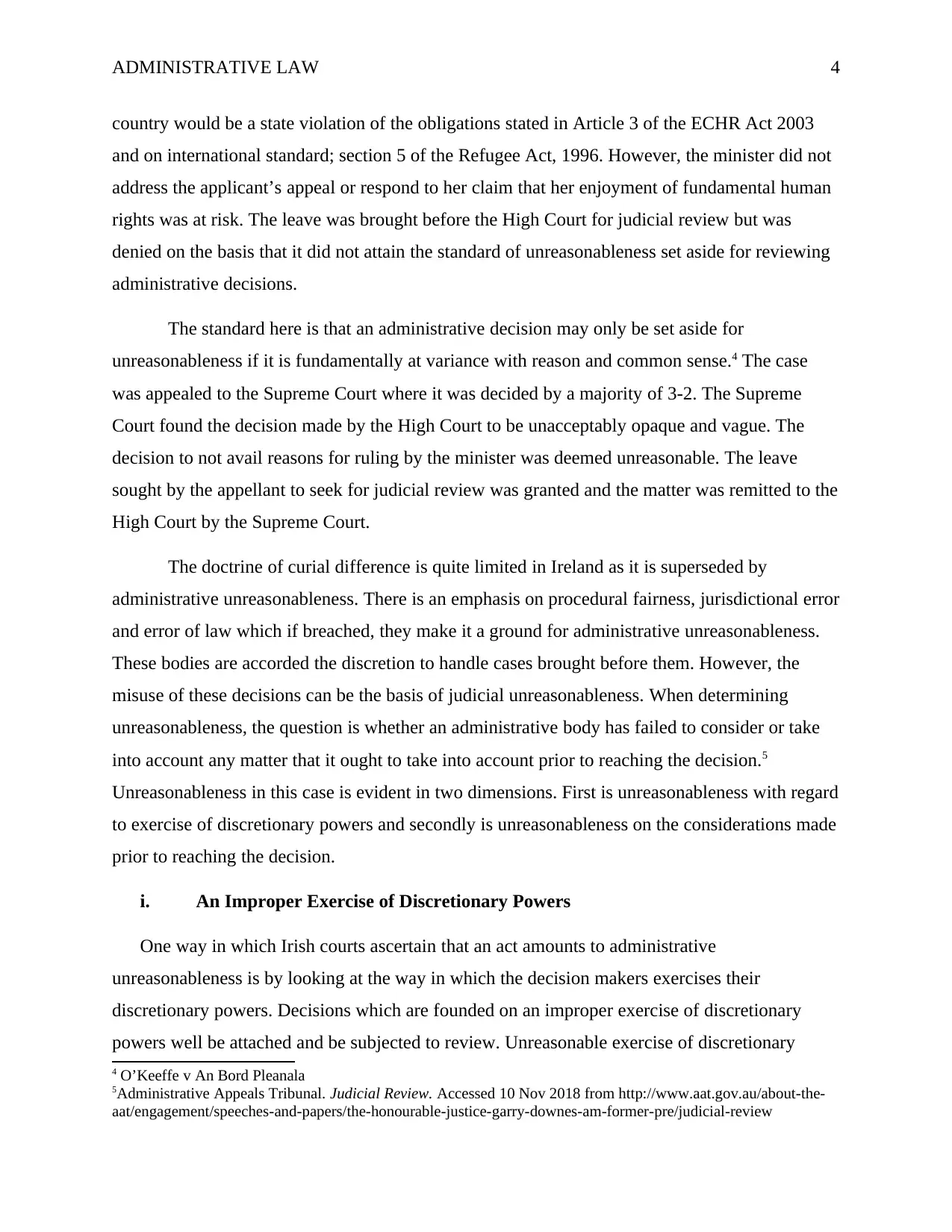
ADMINISTRATIVE LAW 4
country would be a state violation of the obligations stated in Article 3 of the ECHR Act 2003
and on international standard; section 5 of the Refugee Act, 1996. However, the minister did not
address the applicant’s appeal or respond to her claim that her enjoyment of fundamental human
rights was at risk. The leave was brought before the High Court for judicial review but was
denied on the basis that it did not attain the standard of unreasonableness set aside for reviewing
administrative decisions.
The standard here is that an administrative decision may only be set aside for
unreasonableness if it is fundamentally at variance with reason and common sense.4 The case
was appealed to the Supreme Court where it was decided by a majority of 3-2. The Supreme
Court found the decision made by the High Court to be unacceptably opaque and vague. The
decision to not avail reasons for ruling by the minister was deemed unreasonable. The leave
sought by the appellant to seek for judicial review was granted and the matter was remitted to the
High Court by the Supreme Court.
The doctrine of curial difference is quite limited in Ireland as it is superseded by
administrative unreasonableness. There is an emphasis on procedural fairness, jurisdictional error
and error of law which if breached, they make it a ground for administrative unreasonableness.
These bodies are accorded the discretion to handle cases brought before them. However, the
misuse of these decisions can be the basis of judicial unreasonableness. When determining
unreasonableness, the question is whether an administrative body has failed to consider or take
into account any matter that it ought to take into account prior to reaching the decision.5
Unreasonableness in this case is evident in two dimensions. First is unreasonableness with regard
to exercise of discretionary powers and secondly is unreasonableness on the considerations made
prior to reaching the decision.
i. An Improper Exercise of Discretionary Powers
One way in which Irish courts ascertain that an act amounts to administrative
unreasonableness is by looking at the way in which the decision makers exercises their
discretionary powers. Decisions which are founded on an improper exercise of discretionary
powers well be attached and be subjected to review. Unreasonable exercise of discretionary
4 O’Keeffe v An Bord Pleanala
5Administrative Appeals Tribunal. Judicial Review. Accessed 10 Nov 2018 from http://www.aat.gov.au/about-the-
aat/engagement/speeches-and-papers/the-honourable-justice-garry-downes-am-former-pre/judicial-review
country would be a state violation of the obligations stated in Article 3 of the ECHR Act 2003
and on international standard; section 5 of the Refugee Act, 1996. However, the minister did not
address the applicant’s appeal or respond to her claim that her enjoyment of fundamental human
rights was at risk. The leave was brought before the High Court for judicial review but was
denied on the basis that it did not attain the standard of unreasonableness set aside for reviewing
administrative decisions.
The standard here is that an administrative decision may only be set aside for
unreasonableness if it is fundamentally at variance with reason and common sense.4 The case
was appealed to the Supreme Court where it was decided by a majority of 3-2. The Supreme
Court found the decision made by the High Court to be unacceptably opaque and vague. The
decision to not avail reasons for ruling by the minister was deemed unreasonable. The leave
sought by the appellant to seek for judicial review was granted and the matter was remitted to the
High Court by the Supreme Court.
The doctrine of curial difference is quite limited in Ireland as it is superseded by
administrative unreasonableness. There is an emphasis on procedural fairness, jurisdictional error
and error of law which if breached, they make it a ground for administrative unreasonableness.
These bodies are accorded the discretion to handle cases brought before them. However, the
misuse of these decisions can be the basis of judicial unreasonableness. When determining
unreasonableness, the question is whether an administrative body has failed to consider or take
into account any matter that it ought to take into account prior to reaching the decision.5
Unreasonableness in this case is evident in two dimensions. First is unreasonableness with regard
to exercise of discretionary powers and secondly is unreasonableness on the considerations made
prior to reaching the decision.
i. An Improper Exercise of Discretionary Powers
One way in which Irish courts ascertain that an act amounts to administrative
unreasonableness is by looking at the way in which the decision makers exercises their
discretionary powers. Decisions which are founded on an improper exercise of discretionary
powers well be attached and be subjected to review. Unreasonable exercise of discretionary
4 O’Keeffe v An Bord Pleanala
5Administrative Appeals Tribunal. Judicial Review. Accessed 10 Nov 2018 from http://www.aat.gov.au/about-the-
aat/engagement/speeches-and-papers/the-honourable-justice-garry-downes-am-former-pre/judicial-review
Paraphrase This Document
Need a fresh take? Get an instant paraphrase of this document with our AI Paraphraser
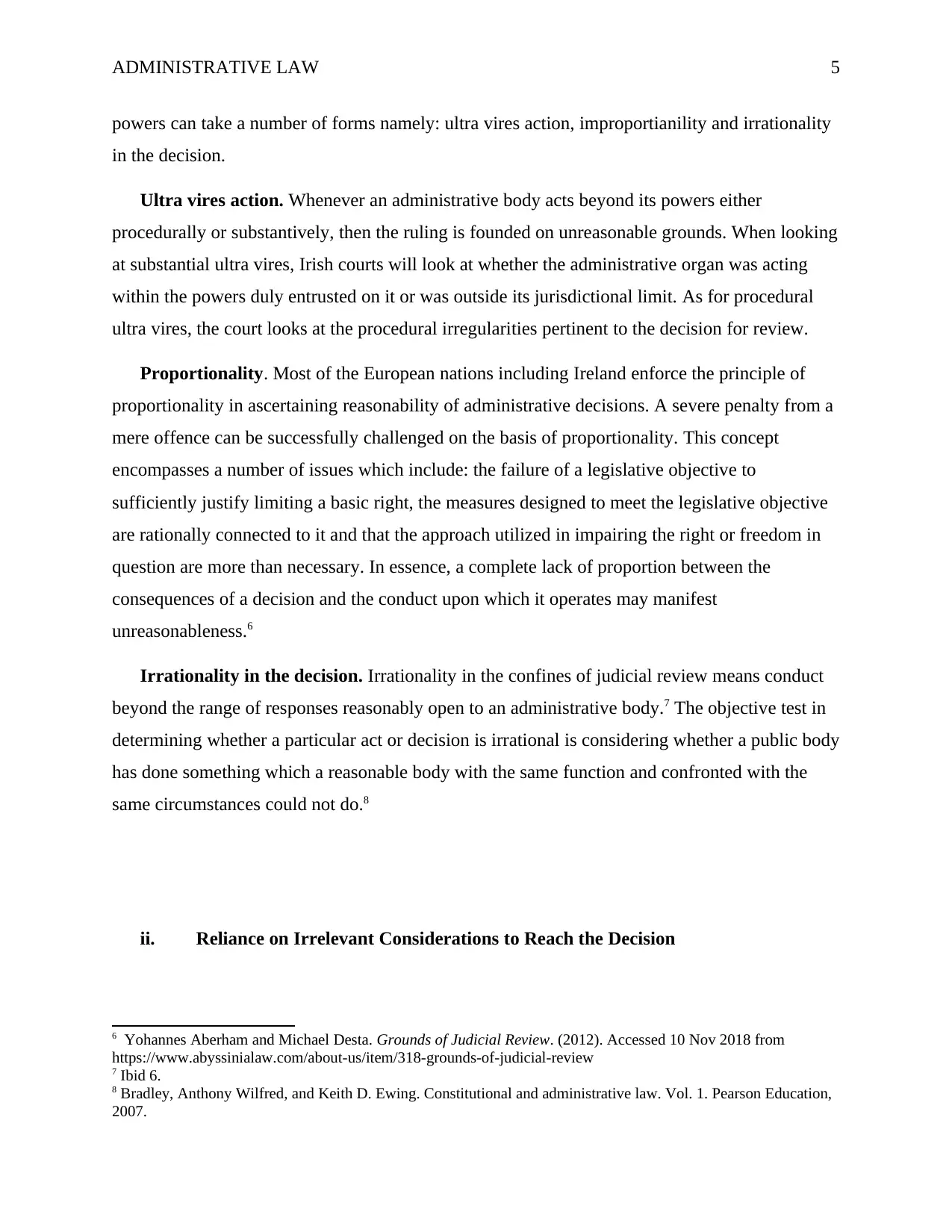
ADMINISTRATIVE LAW 5
powers can take a number of forms namely: ultra vires action, improportianility and irrationality
in the decision.
Ultra vires action. Whenever an administrative body acts beyond its powers either
procedurally or substantively, then the ruling is founded on unreasonable grounds. When looking
at substantial ultra vires, Irish courts will look at whether the administrative organ was acting
within the powers duly entrusted on it or was outside its jurisdictional limit. As for procedural
ultra vires, the court looks at the procedural irregularities pertinent to the decision for review.
Proportionality. Most of the European nations including Ireland enforce the principle of
proportionality in ascertaining reasonability of administrative decisions. A severe penalty from a
mere offence can be successfully challenged on the basis of proportionality. This concept
encompasses a number of issues which include: the failure of a legislative objective to
sufficiently justify limiting a basic right, the measures designed to meet the legislative objective
are rationally connected to it and that the approach utilized in impairing the right or freedom in
question are more than necessary. In essence, a complete lack of proportion between the
consequences of a decision and the conduct upon which it operates may manifest
unreasonableness.6
Irrationality in the decision. Irrationality in the confines of judicial review means conduct
beyond the range of responses reasonably open to an administrative body.7 The objective test in
determining whether a particular act or decision is irrational is considering whether a public body
has done something which a reasonable body with the same function and confronted with the
same circumstances could not do.8
ii. Reliance on Irrelevant Considerations to Reach the Decision
6 Yohannes Aberham and Michael Desta. Grounds of Judicial Review. (2012). Accessed 10 Nov 2018 from
https://www.abyssinialaw.com/about-us/item/318-grounds-of-judicial-review
7 Ibid 6.
8 Bradley, Anthony Wilfred, and Keith D. Ewing. Constitutional and administrative law. Vol. 1. Pearson Education,
2007.
powers can take a number of forms namely: ultra vires action, improportianility and irrationality
in the decision.
Ultra vires action. Whenever an administrative body acts beyond its powers either
procedurally or substantively, then the ruling is founded on unreasonable grounds. When looking
at substantial ultra vires, Irish courts will look at whether the administrative organ was acting
within the powers duly entrusted on it or was outside its jurisdictional limit. As for procedural
ultra vires, the court looks at the procedural irregularities pertinent to the decision for review.
Proportionality. Most of the European nations including Ireland enforce the principle of
proportionality in ascertaining reasonability of administrative decisions. A severe penalty from a
mere offence can be successfully challenged on the basis of proportionality. This concept
encompasses a number of issues which include: the failure of a legislative objective to
sufficiently justify limiting a basic right, the measures designed to meet the legislative objective
are rationally connected to it and that the approach utilized in impairing the right or freedom in
question are more than necessary. In essence, a complete lack of proportion between the
consequences of a decision and the conduct upon which it operates may manifest
unreasonableness.6
Irrationality in the decision. Irrationality in the confines of judicial review means conduct
beyond the range of responses reasonably open to an administrative body.7 The objective test in
determining whether a particular act or decision is irrational is considering whether a public body
has done something which a reasonable body with the same function and confronted with the
same circumstances could not do.8
ii. Reliance on Irrelevant Considerations to Reach the Decision
6 Yohannes Aberham and Michael Desta. Grounds of Judicial Review. (2012). Accessed 10 Nov 2018 from
https://www.abyssinialaw.com/about-us/item/318-grounds-of-judicial-review
7 Ibid 6.
8 Bradley, Anthony Wilfred, and Keith D. Ewing. Constitutional and administrative law. Vol. 1. Pearson Education,
2007.
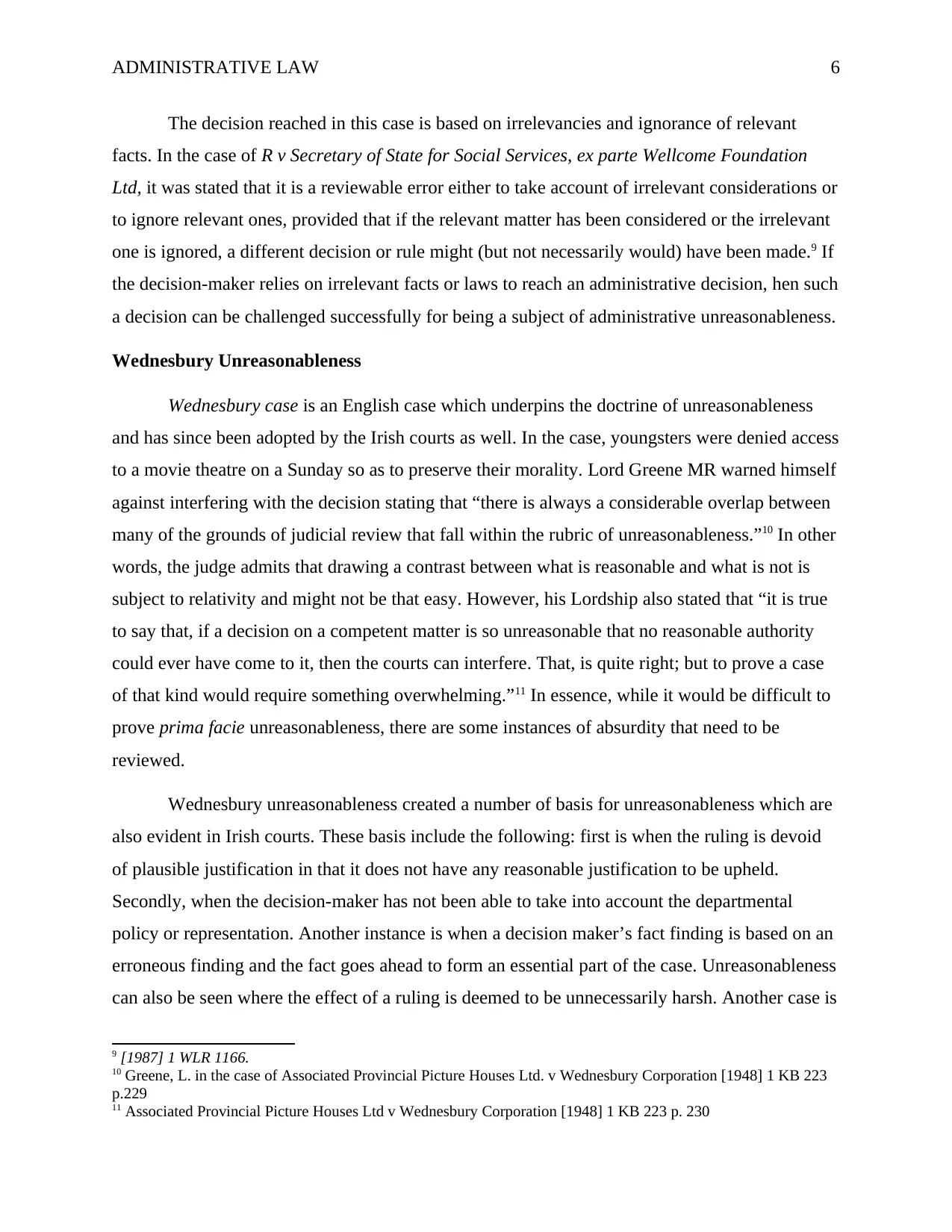
ADMINISTRATIVE LAW 6
The decision reached in this case is based on irrelevancies and ignorance of relevant
facts. In the case of R v Secretary of State for Social Services, ex parte Wellcome Foundation
Ltd, it was stated that it is a reviewable error either to take account of irrelevant considerations or
to ignore relevant ones, provided that if the relevant matter has been considered or the irrelevant
one is ignored, a different decision or rule might (but not necessarily would) have been made.9 If
the decision-maker relies on irrelevant facts or laws to reach an administrative decision, hen such
a decision can be challenged successfully for being a subject of administrative unreasonableness.
Wednesbury Unreasonableness
Wednesbury case is an English case which underpins the doctrine of unreasonableness
and has since been adopted by the Irish courts as well. In the case, youngsters were denied access
to a movie theatre on a Sunday so as to preserve their morality. Lord Greene MR warned himself
against interfering with the decision stating that “there is always a considerable overlap between
many of the grounds of judicial review that fall within the rubric of unreasonableness.”10 In other
words, the judge admits that drawing a contrast between what is reasonable and what is not is
subject to relativity and might not be that easy. However, his Lordship also stated that “it is true
to say that, if a decision on a competent matter is so unreasonable that no reasonable authority
could ever have come to it, then the courts can interfere. That, is quite right; but to prove a case
of that kind would require something overwhelming.”11 In essence, while it would be difficult to
prove prima facie unreasonableness, there are some instances of absurdity that need to be
reviewed.
Wednesbury unreasonableness created a number of basis for unreasonableness which are
also evident in Irish courts. These basis include the following: first is when the ruling is devoid
of plausible justification in that it does not have any reasonable justification to be upheld.
Secondly, when the decision-maker has not been able to take into account the departmental
policy or representation. Another instance is when a decision maker’s fact finding is based on an
erroneous finding and the fact goes ahead to form an essential part of the case. Unreasonableness
can also be seen where the effect of a ruling is deemed to be unnecessarily harsh. Another case is
9 [1987] 1 WLR 1166.
10 Greene, L. in the case of Associated Provincial Picture Houses Ltd. v Wednesbury Corporation [1948] 1 KB 223
p.229
11 Associated Provincial Picture Houses Ltd v Wednesbury Corporation [1948] 1 KB 223 p. 230
The decision reached in this case is based on irrelevancies and ignorance of relevant
facts. In the case of R v Secretary of State for Social Services, ex parte Wellcome Foundation
Ltd, it was stated that it is a reviewable error either to take account of irrelevant considerations or
to ignore relevant ones, provided that if the relevant matter has been considered or the irrelevant
one is ignored, a different decision or rule might (but not necessarily would) have been made.9 If
the decision-maker relies on irrelevant facts or laws to reach an administrative decision, hen such
a decision can be challenged successfully for being a subject of administrative unreasonableness.
Wednesbury Unreasonableness
Wednesbury case is an English case which underpins the doctrine of unreasonableness
and has since been adopted by the Irish courts as well. In the case, youngsters were denied access
to a movie theatre on a Sunday so as to preserve their morality. Lord Greene MR warned himself
against interfering with the decision stating that “there is always a considerable overlap between
many of the grounds of judicial review that fall within the rubric of unreasonableness.”10 In other
words, the judge admits that drawing a contrast between what is reasonable and what is not is
subject to relativity and might not be that easy. However, his Lordship also stated that “it is true
to say that, if a decision on a competent matter is so unreasonable that no reasonable authority
could ever have come to it, then the courts can interfere. That, is quite right; but to prove a case
of that kind would require something overwhelming.”11 In essence, while it would be difficult to
prove prima facie unreasonableness, there are some instances of absurdity that need to be
reviewed.
Wednesbury unreasonableness created a number of basis for unreasonableness which are
also evident in Irish courts. These basis include the following: first is when the ruling is devoid
of plausible justification in that it does not have any reasonable justification to be upheld.
Secondly, when the decision-maker has not been able to take into account the departmental
policy or representation. Another instance is when a decision maker’s fact finding is based on an
erroneous finding and the fact goes ahead to form an essential part of the case. Unreasonableness
can also be seen where the effect of a ruling is deemed to be unnecessarily harsh. Another case is
9 [1987] 1 WLR 1166.
10 Greene, L. in the case of Associated Provincial Picture Houses Ltd. v Wednesbury Corporation [1948] 1 KB 223
p.229
11 Associated Provincial Picture Houses Ltd v Wednesbury Corporation [1948] 1 KB 223 p. 230
⊘ This is a preview!⊘
Do you want full access?
Subscribe today to unlock all pages.

Trusted by 1+ million students worldwide
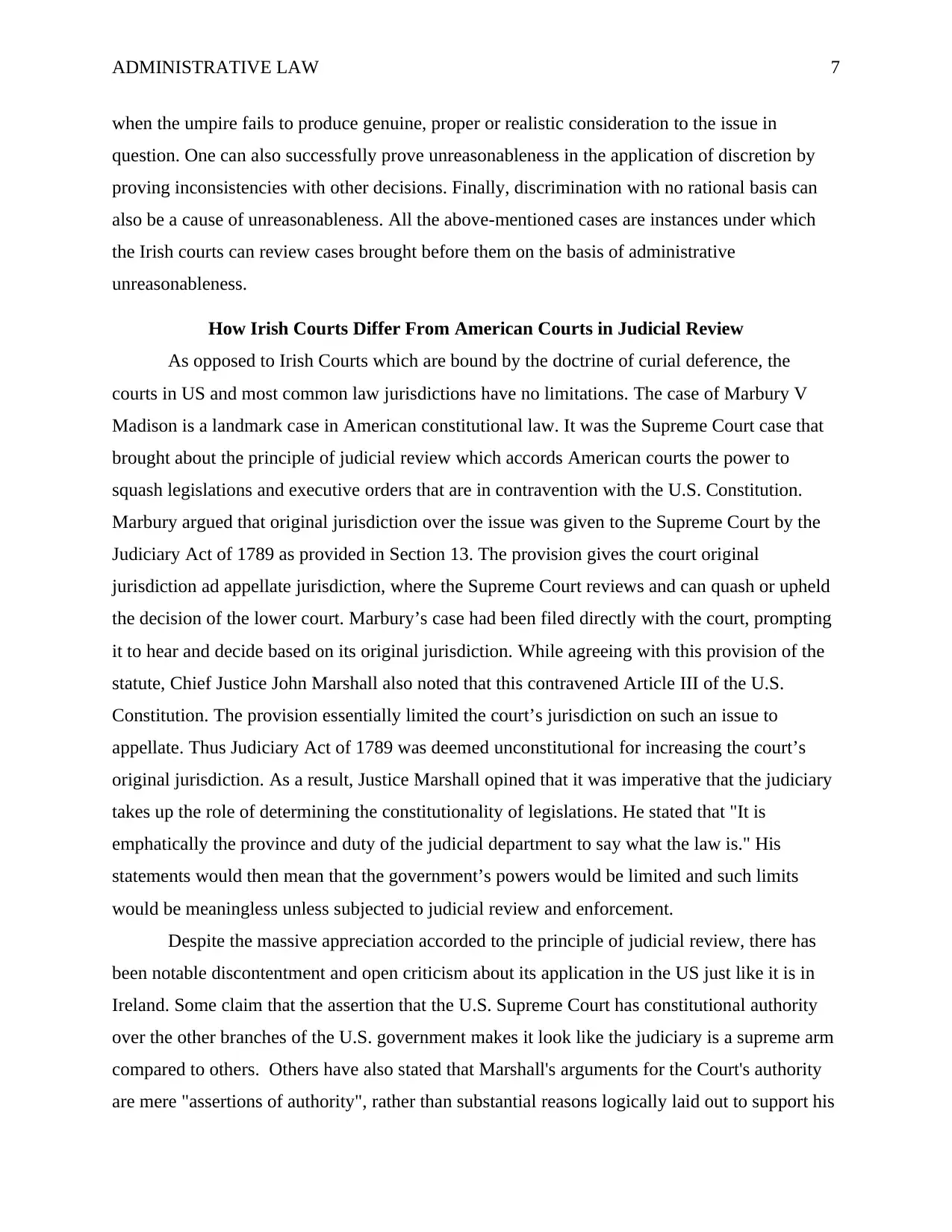
ADMINISTRATIVE LAW 7
when the umpire fails to produce genuine, proper or realistic consideration to the issue in
question. One can also successfully prove unreasonableness in the application of discretion by
proving inconsistencies with other decisions. Finally, discrimination with no rational basis can
also be a cause of unreasonableness. All the above-mentioned cases are instances under which
the Irish courts can review cases brought before them on the basis of administrative
unreasonableness.
How Irish Courts Differ From American Courts in Judicial Review
As opposed to Irish Courts which are bound by the doctrine of curial deference, the
courts in US and most common law jurisdictions have no limitations. The case of Marbury V
Madison is a landmark case in American constitutional law. It was the Supreme Court case that
brought about the principle of judicial review which accords American courts the power to
squash legislations and executive orders that are in contravention with the U.S. Constitution.
Marbury argued that original jurisdiction over the issue was given to the Supreme Court by the
Judiciary Act of 1789 as provided in Section 13. The provision gives the court original
jurisdiction ad appellate jurisdiction, where the Supreme Court reviews and can quash or upheld
the decision of the lower court. Marbury’s case had been filed directly with the court, prompting
it to hear and decide based on its original jurisdiction. While agreeing with this provision of the
statute, Chief Justice John Marshall also noted that this contravened Article III of the U.S.
Constitution. The provision essentially limited the court’s jurisdiction on such an issue to
appellate. Thus Judiciary Act of 1789 was deemed unconstitutional for increasing the court’s
original jurisdiction. As a result, Justice Marshall opined that it was imperative that the judiciary
takes up the role of determining the constitutionality of legislations. He stated that "It is
emphatically the province and duty of the judicial department to say what the law is." His
statements would then mean that the government’s powers would be limited and such limits
would be meaningless unless subjected to judicial review and enforcement.
Despite the massive appreciation accorded to the principle of judicial review, there has
been notable discontentment and open criticism about its application in the US just like it is in
Ireland. Some claim that the assertion that the U.S. Supreme Court has constitutional authority
over the other branches of the U.S. government makes it look like the judiciary is a supreme arm
compared to others. Others have also stated that Marshall's arguments for the Court's authority
are mere "assertions of authority", rather than substantial reasons logically laid out to support his
when the umpire fails to produce genuine, proper or realistic consideration to the issue in
question. One can also successfully prove unreasonableness in the application of discretion by
proving inconsistencies with other decisions. Finally, discrimination with no rational basis can
also be a cause of unreasonableness. All the above-mentioned cases are instances under which
the Irish courts can review cases brought before them on the basis of administrative
unreasonableness.
How Irish Courts Differ From American Courts in Judicial Review
As opposed to Irish Courts which are bound by the doctrine of curial deference, the
courts in US and most common law jurisdictions have no limitations. The case of Marbury V
Madison is a landmark case in American constitutional law. It was the Supreme Court case that
brought about the principle of judicial review which accords American courts the power to
squash legislations and executive orders that are in contravention with the U.S. Constitution.
Marbury argued that original jurisdiction over the issue was given to the Supreme Court by the
Judiciary Act of 1789 as provided in Section 13. The provision gives the court original
jurisdiction ad appellate jurisdiction, where the Supreme Court reviews and can quash or upheld
the decision of the lower court. Marbury’s case had been filed directly with the court, prompting
it to hear and decide based on its original jurisdiction. While agreeing with this provision of the
statute, Chief Justice John Marshall also noted that this contravened Article III of the U.S.
Constitution. The provision essentially limited the court’s jurisdiction on such an issue to
appellate. Thus Judiciary Act of 1789 was deemed unconstitutional for increasing the court’s
original jurisdiction. As a result, Justice Marshall opined that it was imperative that the judiciary
takes up the role of determining the constitutionality of legislations. He stated that "It is
emphatically the province and duty of the judicial department to say what the law is." His
statements would then mean that the government’s powers would be limited and such limits
would be meaningless unless subjected to judicial review and enforcement.
Despite the massive appreciation accorded to the principle of judicial review, there has
been notable discontentment and open criticism about its application in the US just like it is in
Ireland. Some claim that the assertion that the U.S. Supreme Court has constitutional authority
over the other branches of the U.S. government makes it look like the judiciary is a supreme arm
compared to others. Others have also stated that Marshall's arguments for the Court's authority
are mere "assertions of authority", rather than substantial reasons logically laid out to support his
Paraphrase This Document
Need a fresh take? Get an instant paraphrase of this document with our AI Paraphraser
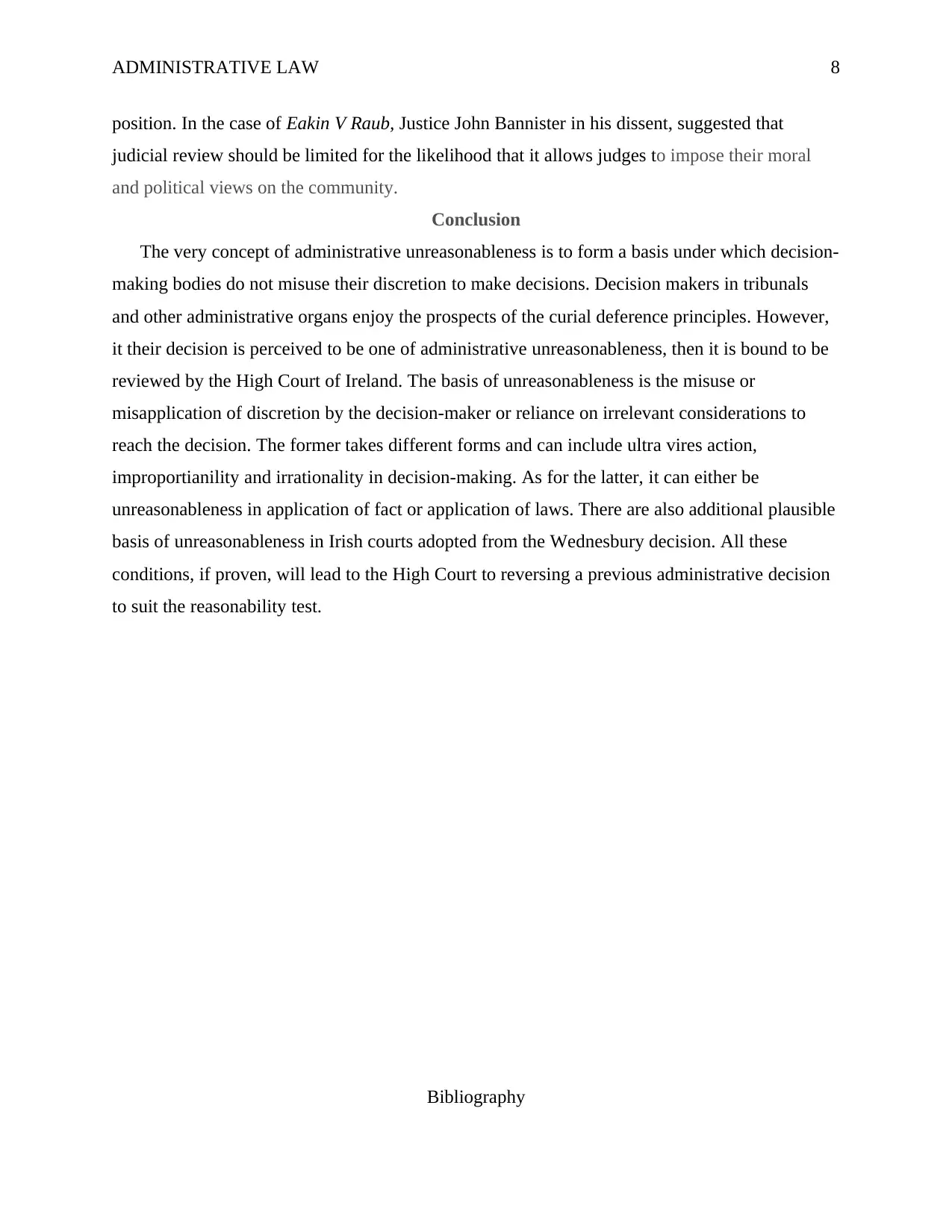
ADMINISTRATIVE LAW 8
position. In the case of Eakin V Raub, Justice John Bannister in his dissent, suggested that
judicial review should be limited for the likelihood that it allows judges to impose their moral
and political views on the community.
Conclusion
The very concept of administrative unreasonableness is to form a basis under which decision-
making bodies do not misuse their discretion to make decisions. Decision makers in tribunals
and other administrative organs enjoy the prospects of the curial deference principles. However,
it their decision is perceived to be one of administrative unreasonableness, then it is bound to be
reviewed by the High Court of Ireland. The basis of unreasonableness is the misuse or
misapplication of discretion by the decision-maker or reliance on irrelevant considerations to
reach the decision. The former takes different forms and can include ultra vires action,
improportianility and irrationality in decision-making. As for the latter, it can either be
unreasonableness in application of fact or application of laws. There are also additional plausible
basis of unreasonableness in Irish courts adopted from the Wednesbury decision. All these
conditions, if proven, will lead to the High Court to reversing a previous administrative decision
to suit the reasonability test.
Bibliography
position. In the case of Eakin V Raub, Justice John Bannister in his dissent, suggested that
judicial review should be limited for the likelihood that it allows judges to impose their moral
and political views on the community.
Conclusion
The very concept of administrative unreasonableness is to form a basis under which decision-
making bodies do not misuse their discretion to make decisions. Decision makers in tribunals
and other administrative organs enjoy the prospects of the curial deference principles. However,
it their decision is perceived to be one of administrative unreasonableness, then it is bound to be
reviewed by the High Court of Ireland. The basis of unreasonableness is the misuse or
misapplication of discretion by the decision-maker or reliance on irrelevant considerations to
reach the decision. The former takes different forms and can include ultra vires action,
improportianility and irrationality in decision-making. As for the latter, it can either be
unreasonableness in application of fact or application of laws. There are also additional plausible
basis of unreasonableness in Irish courts adopted from the Wednesbury decision. All these
conditions, if proven, will lead to the High Court to reversing a previous administrative decision
to suit the reasonability test.
Bibliography
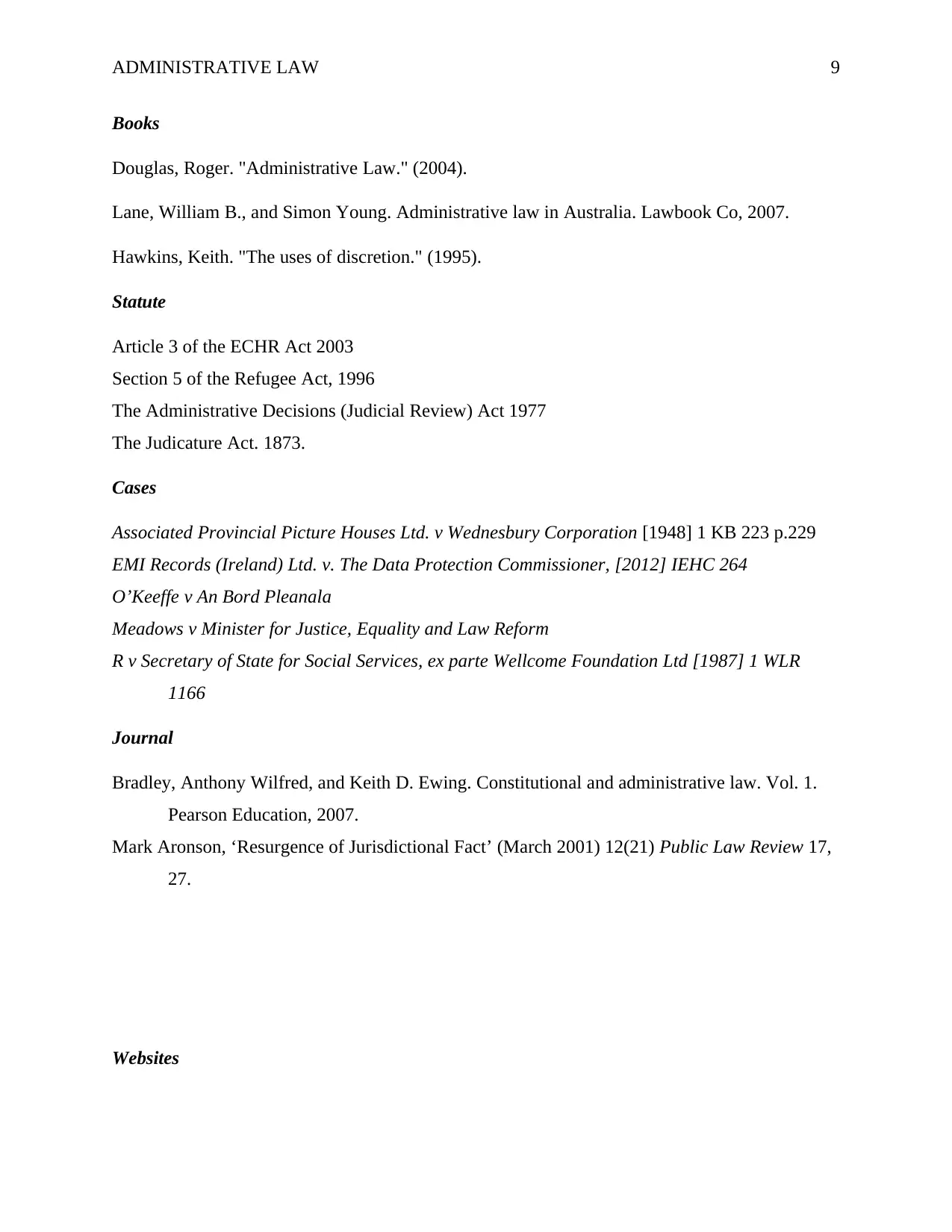
ADMINISTRATIVE LAW 9
Books
Douglas, Roger. "Administrative Law." (2004).
Lane, William B., and Simon Young. Administrative law in Australia. Lawbook Co, 2007.
Hawkins, Keith. "The uses of discretion." (1995).
Statute
Article 3 of the ECHR Act 2003
Section 5 of the Refugee Act, 1996
The Administrative Decisions (Judicial Review) Act 1977
The Judicature Act. 1873.
Cases
Associated Provincial Picture Houses Ltd. v Wednesbury Corporation [1948] 1 KB 223 p.229
EMI Records (Ireland) Ltd. v. The Data Protection Commissioner, [2012] IEHC 264
O’Keeffe v An Bord Pleanala
Meadows v Minister for Justice, Equality and Law Reform
R v Secretary of State for Social Services, ex parte Wellcome Foundation Ltd [1987] 1 WLR
1166
Journal
Bradley, Anthony Wilfred, and Keith D. Ewing. Constitutional and administrative law. Vol. 1.
Pearson Education, 2007.
Mark Aronson, ‘Resurgence of Jurisdictional Fact’ (March 2001) 12(21) Public Law Review 17,
27.
Websites
Books
Douglas, Roger. "Administrative Law." (2004).
Lane, William B., and Simon Young. Administrative law in Australia. Lawbook Co, 2007.
Hawkins, Keith. "The uses of discretion." (1995).
Statute
Article 3 of the ECHR Act 2003
Section 5 of the Refugee Act, 1996
The Administrative Decisions (Judicial Review) Act 1977
The Judicature Act. 1873.
Cases
Associated Provincial Picture Houses Ltd. v Wednesbury Corporation [1948] 1 KB 223 p.229
EMI Records (Ireland) Ltd. v. The Data Protection Commissioner, [2012] IEHC 264
O’Keeffe v An Bord Pleanala
Meadows v Minister for Justice, Equality and Law Reform
R v Secretary of State for Social Services, ex parte Wellcome Foundation Ltd [1987] 1 WLR
1166
Journal
Bradley, Anthony Wilfred, and Keith D. Ewing. Constitutional and administrative law. Vol. 1.
Pearson Education, 2007.
Mark Aronson, ‘Resurgence of Jurisdictional Fact’ (March 2001) 12(21) Public Law Review 17,
27.
Websites
⊘ This is a preview!⊘
Do you want full access?
Subscribe today to unlock all pages.

Trusted by 1+ million students worldwide
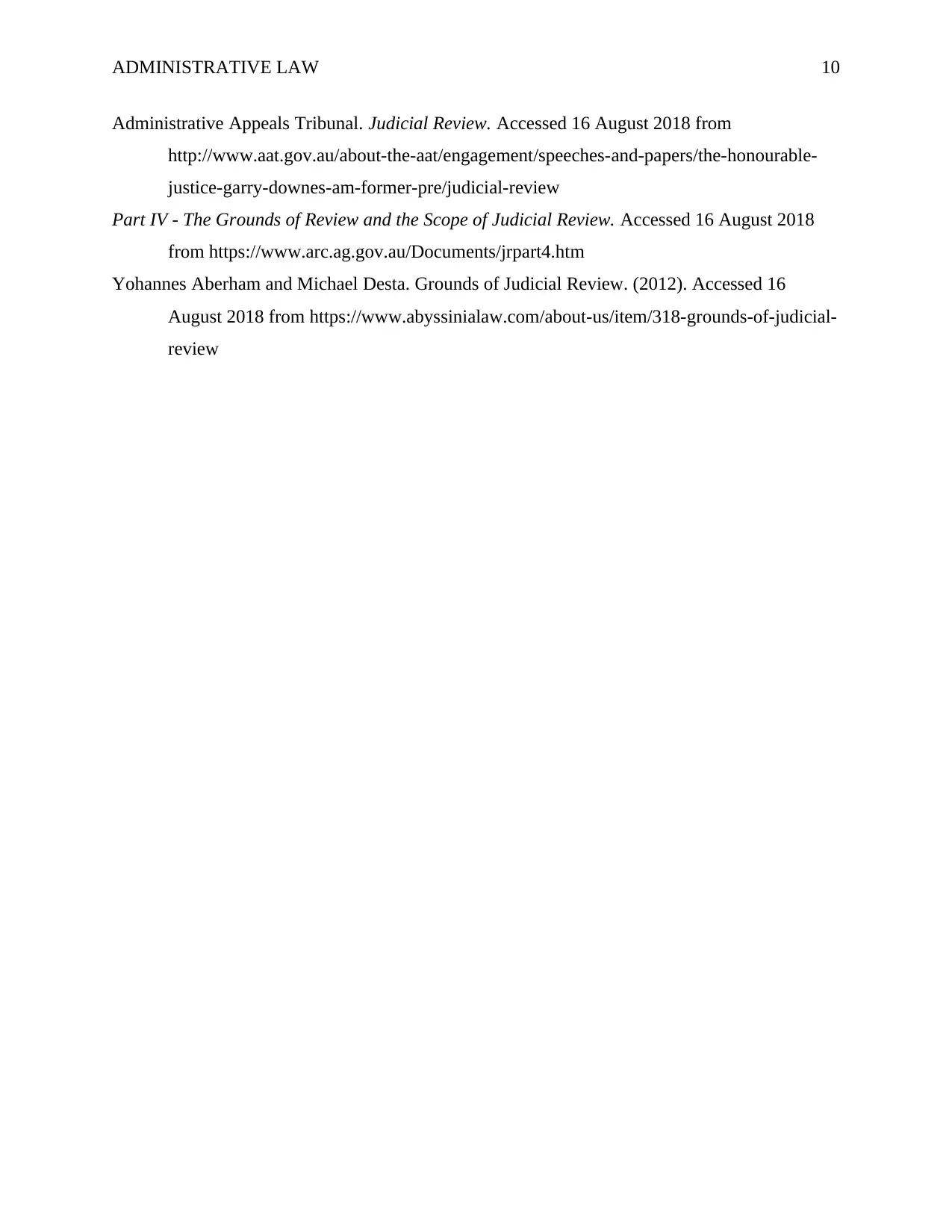
ADMINISTRATIVE LAW 10
Administrative Appeals Tribunal. Judicial Review. Accessed 16 August 2018 from
http://www.aat.gov.au/about-the-aat/engagement/speeches-and-papers/the-honourable-
justice-garry-downes-am-former-pre/judicial-review
Part IV - The Grounds of Review and the Scope of Judicial Review. Accessed 16 August 2018
from https://www.arc.ag.gov.au/Documents/jrpart4.htm
Yohannes Aberham and Michael Desta. Grounds of Judicial Review. (2012). Accessed 16
August 2018 from https://www.abyssinialaw.com/about-us/item/318-grounds-of-judicial-
review
Administrative Appeals Tribunal. Judicial Review. Accessed 16 August 2018 from
http://www.aat.gov.au/about-the-aat/engagement/speeches-and-papers/the-honourable-
justice-garry-downes-am-former-pre/judicial-review
Part IV - The Grounds of Review and the Scope of Judicial Review. Accessed 16 August 2018
from https://www.arc.ag.gov.au/Documents/jrpart4.htm
Yohannes Aberham and Michael Desta. Grounds of Judicial Review. (2012). Accessed 16
August 2018 from https://www.abyssinialaw.com/about-us/item/318-grounds-of-judicial-
review
1 out of 10
Related Documents
Your All-in-One AI-Powered Toolkit for Academic Success.
+13062052269
info@desklib.com
Available 24*7 on WhatsApp / Email
![[object Object]](/_next/static/media/star-bottom.7253800d.svg)
Unlock your academic potential
Copyright © 2020–2026 A2Z Services. All Rights Reserved. Developed and managed by ZUCOL.




